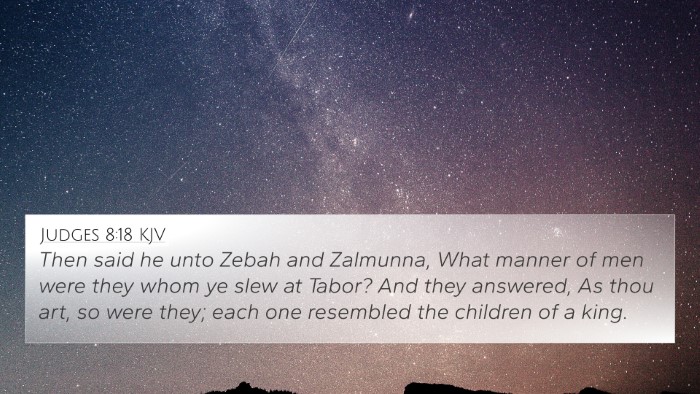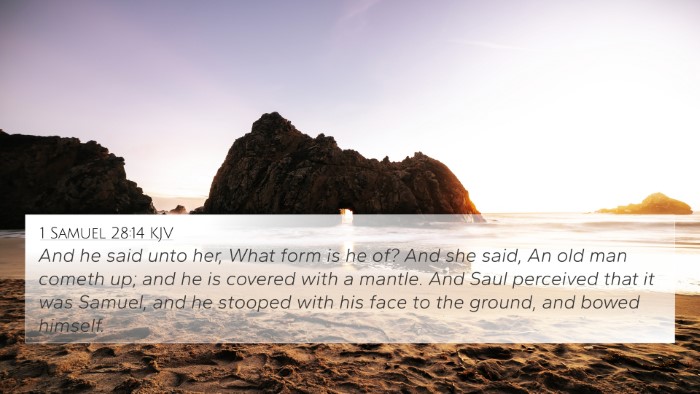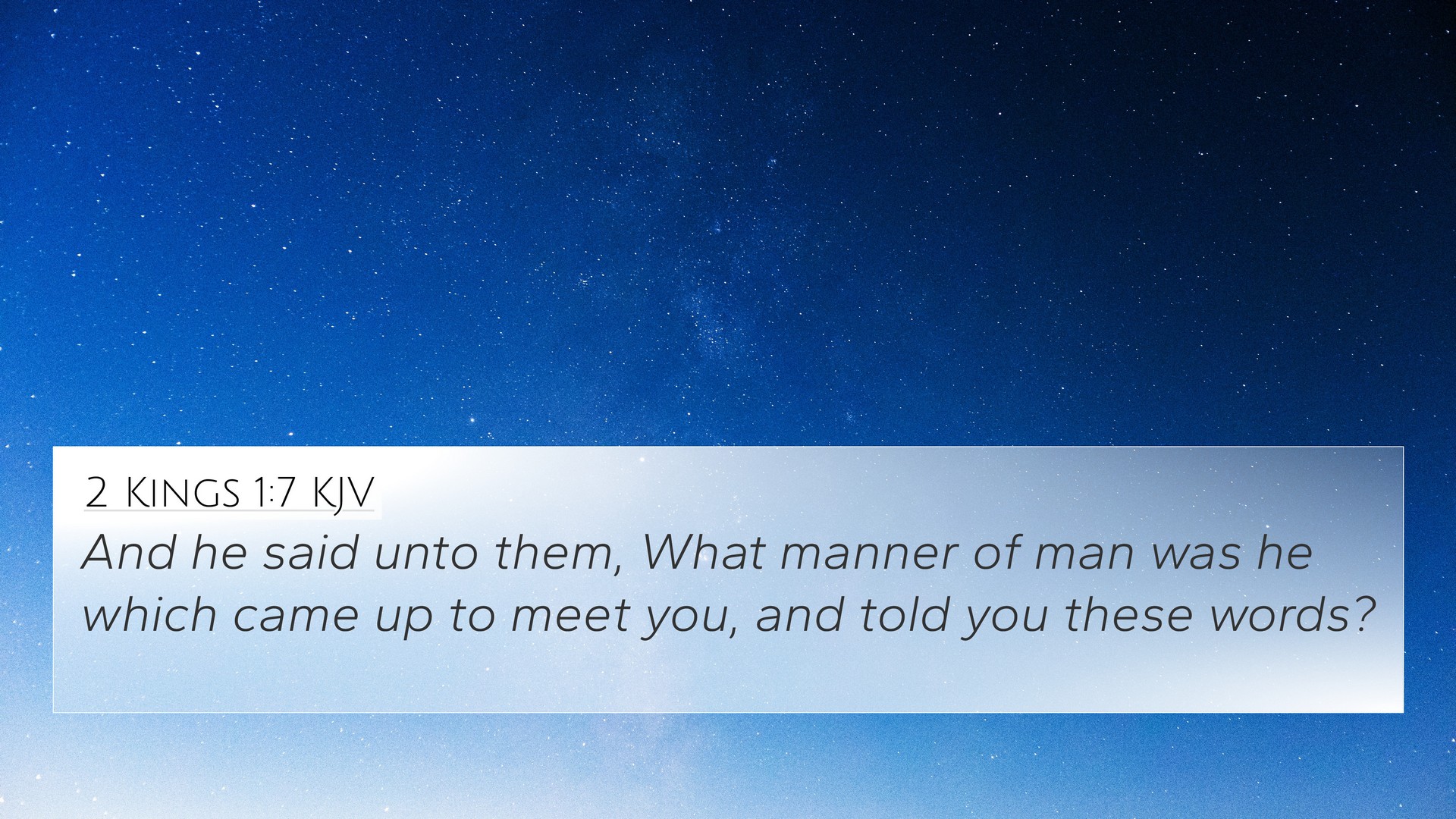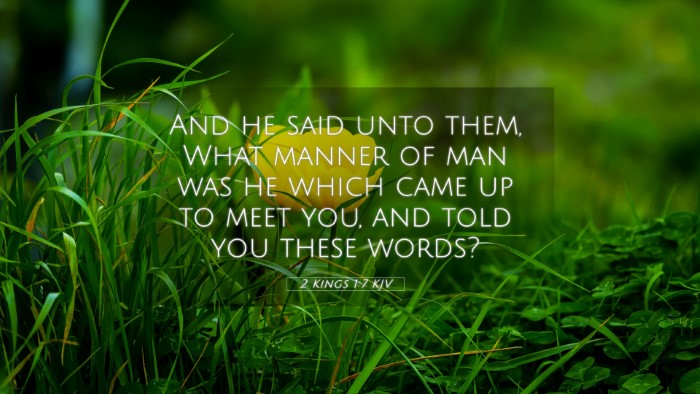Old Testament
Genesis Exodus Leviticus Numbers Deuteronomy Joshua Judges Ruth 1 Samuel 2 Samuel 1 Kings 2 Kings 1 Chronicles 2 Chronicles Ezra Nehemiah Esther Job Psalms Proverbs Ecclesiastes Song of Solomon Isaiah Jeremiah Lamentations Ezekiel Daniel Hosea Joel Amos Obadiah Jonah Micah Nahum Habakkuk Zephaniah Haggai Zechariah Malachi2 Kings 1:7 Similar Verses
2 Kings 1:7 Cross References
And he said unto them, What manner of man was he which came up to meet you, and told you these words?
Uncover the Rich Themes and Topics of This Bible Verse
Listed below are the Bible themes associated with 2 Kings 1:7. We invite you to explore each theme to gain deeper insights into the Scriptures.
2 Kings 1:7 Cross Reference Verses
This section features a detailed cross-reference designed to enrich your understanding of the Scriptures. Below, you will find carefully selected verses that echo the themes and teachings related to 2 Kings 1:7 KJV. Click on any image to explore detailed analyses of related Bible verses and uncover deeper theological insights.

Judges 8:18 (KJV) »
Then said he unto Zebah and Zalmunna, What manner of men were they whom ye slew at Tabor? And they answered, As thou art, so were they; each one resembled the children of a king.

1 Samuel 28:14 (KJV) »
And he said unto her, What form is he of? And she said, An old man cometh up; and he is covered with a mantle. And Saul perceived that it was Samuel, and he stooped with his face to the ground, and bowed himself.
2 Kings 1:7 Verse Analysis and Similar Verses
Understanding 2 Kings 1:7
Bible Verse: 2 Kings 1:7
In this verse, King Ahaziah of Israel is inquiring about the identity of a man of God who has delivered prophecies. This questioning reveals the king's desperation and his desire to seek knowledge from divine sources.
Verse Context
The context of 2 Kings 1:7 involves King Ahaziah's injuries from a fall, leading him to seek counsel from Baal-zebub, the god of Ekron, instead of turning to the Lord. The prophet Elijah confronts this idolatry by revealing God's displeasure and delivering a message of judgment.
Commentary Insights
-
Matthew Henry:
Henry emphasizes the folly of relying on false gods and the significance of seeking true prophecy from God. He notes Ahaziah’s inability to recognize God’s sovereign power and his dependence on unreliable sources.
-
Albert Barnes:
Barnes illustrates the extent of the king’s blindness to the truth and the seriousness of consulting demons rather than God. He contrasts Ahaziah's inquiries with the role of prophets, highlighting the importance of divine revelation.
-
Adam Clarke:
Clarke adds that Ahaziah's questioning reflects his state of mind, driven by fear and unrest. He highlights that true understanding comes from recognizing God's authority, which Ahaziah failed to do.
Thematic Connections
This verse has several themes worth noting:
- Idolatry: Ahaziah turns to Baal-zebub, reflecting the temptation to seek power and answers outside God.
- Divine Authority: The verse highlights that true prophecy and authority come from God alone, not from idols.
- Judgment: Ahaziah's fate as prophesied by Elijah portrays the consequences of forsaking God.
Cross-References
Here are related Bible verses that enhance the understanding of 2 Kings 1:7:
- 1 Kings 18:17-19: Elijah confronts King Ahab regarding Baal worship.
- Deuteronomy 18:10-12: The law forbids consulting mediums and diviners.
- Isaiah 8:19: A warning against seeking guidance from the dead or spirits.
- Luke 16:29-31: The story of Lazarus shows the futility of seeking truths from those who have died, instead of heeding God's word.
- Jeremiah 10:14: The folly of idolatry is emphasized — those who make idols are deceived.
- 1 Corinthians 10:20-21: Paul explains that idol worship concerns devils and that believers cannot share in the Lord's table and devils’ table.
- 1 Samuel 28:7-20: The story of Saul consulting a medium, showing the dangers of seeking advice from forbidden sources.
Significance in Biblical Study
This verse serves as an important reference for understanding the challenges of faith, the call to avoid idolatry, and the dangers of abandoning trust in God. It encourages readers to seek God’s guidance through scripture rather than worldly philosophies or practices.
Conclusion
2 Kings 1:7, while simple, opens a complex dialogue about faith, prophecy, and judgment. By utilizing tools for Bible cross-referencing, such as a Bible concordance or a comprehensive Bible cross-reference guide, one can further explore the connections between this and other scriptures. This enriches one’s understanding of the Bible's cohesive narrative and themes.


